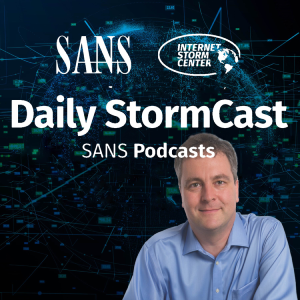Hello and welcome to the Tuesday, May 13th, 2025
edition of the SANS Internet Storm Center's Stormcast. My
name is Johannes Ullrich and today I'm recording from
Jacksonville, Florida. And well, today we got patches
from Apple. So tomorrow, Microsoft patch Tuesday.
Today, Apple patch Monday. Even though, of course, Apple
does publish patches not on a regular schedule. This
particular update fixes 65 different vulnerabilities.
There's one sort of notable vulnerability here and that
one is already being exploited. It's an audio
stream vulnerability. Apple has released a patch for this
particular vulnerability back mid-April, but only for the
most recent versions of iOS and macOS. This update now
does also update some of the older versions of macOS and
iOS. For macOS, it goes back to Ventura, which is 13. So
about two years ago. In addition to this particular
vulnerability that's already being exploited, there are a
number of other notable vulnerabilities. For example,
a couple of vulnerabilities in WebKit that could lead to code
execution if you're visiting a malicious website. Also kind
of an interesting vulnerability in FaceTime,
where apparently the mute button didn't always work as
expected. Of course, that would be a rather embarrassing
mistake in some cases. And our honeypots detected the use of
a new username and password combination, and that's Unipi
and Unipi.Technology. This particular username and
password combination is the default password for devices
created by a company called Unipi Technology. And, well,
they're sort of in the business of kind of IoT, like
home automation, business control systems, and the like.
And, yes, they're still using a default password. It is,
however, pointed out in their quick start guide as sort of a
bold item at the top that you should probably change this
particular password. The malware being spread here,
well, it smells, looks like Mirai. It also does scan using
the good old Netgear vulnerability. That's now, I
think, a 12-year-old vulnerability from 2013. I
think February 2013 is when it first came out, but was only
assigned a CVE number last year. So there's a lot of
confusion around this because it's an old vulnerability, but
it does have a 2024 CVE number. In particular, if
you're looking at this in the context of some of the other
news, like the FBI, for example, taking down that
botnet of out-of-date and unpatchable routers, which was
probably something like this Netgear vulnerability that was
used to compromise those routers. Also, we had like a
CISA advisory that, well, old vulnerabilities are heavily
being used in order to target OT, so ICS technology. And
Microsoft is reporting that new vulnerability in output
messenger is being actively exploited by a group that
Microsoft calls Marble Dust. This particular group attacks,
at least with this vulnerability, targets in the
Middle East and Europe. Now, output manager is a local
messaging application. It's often used by administrators
and such to communicate. It's fairly feature-rich, allows
the easy exchange of files. And the developer of this
application has now actually released a fairly decent blog,
a little bit explaining the vulnerability. It's a
directory traversal vulnerability. So an attacker
can use this vulnerability to gain access to files on the
user's system, which, of course, if they contain
secrets, credentials and such, could potentially be used to
execute code on affected systems. As part of the attack
that Microsoft saw, attackers apparently also took over some
of the output messenger servers that are typically run
locally. So in that case, then, attackers could easily
reach out to additional victims that are using this
particular server. Definitely update as fast as possible,
given the active exploitation of this vulnerability. And
then we have an update for the Commvault story. Remember,
there was a vulnerability. Then Commvault released a
patch. And security researcher Will Dorman stated that the
patch didn't completely fix the vulnerability. Commvault
now came out saying that, well, they did actually fix
the vulnerability. And Dorman also corrected kind of his
original assessment that when he downloaded the version that
I guess is described as a pioneer release, it doesn't
actually come with any patches and updates until you actually
register this version of the software. So you only get
security updates as a paid license customer. If you're
just downloading the test release, you may not get the
latest, greatest version with all the patches applied. Well,
and that's it for today. So thanks for listening. And just
a quick note, I haven't mentioned Sans Fire. Well, you
may see at the top the URL scrolling by in the beginning
and the end of the podcast. But I just want to point out
that we actually are now getting together yet another
one of our honeypot workshops. So we'll give away something
like 20 honeypots for anybody interested in running them in
their network. Also walk you through how to install them
during an evening event at Sans Fire. That's it for
today. Thanks for listening and talk to you again
tomorrow. Bye. Bye.

